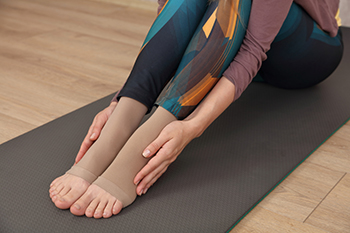
Poor circulation in the legs and feet can lead to discomfort, swelling, numbness, and delayed healing of wounds. It is often linked to diabetes, peripheral artery disease, or a sedentary lifestyle. Limited blood flow reduces oxygen delivery to tissues, which may increase the risk of infections and long-term complications, if left untreated. There are simple steps that can help improve circulation. First, regular movement such as walking or gentle stretching stimulates blood flow and keeps vessels active. Second, wearing supportive footwear and avoiding tight socks can reduce pressure on the feet and ankles. Third, keeping the feet warm with insulated shoes or socks can prevent vessel constriction, which is especially helpful for anyone who is sensitive to even mild cold. If you are experiencing persistent symptoms of poor circulation, it is suggested that you see a podiatrist for a proper diagnosis and appropriate treatment.
While poor circulation itself isn’t a condition; it is a symptom of another underlying health condition you may have. If you have any concerns with poor circulation in your feet contact Philip C. Caswell, DPM of Family Foot & Ankle Care. Our doctor will treat your foot and ankle needs.
Poor Circulation in the Feet
Peripheral artery disease (PAD) can potentially lead to poor circulation in the lower extremities. PAD is a condition that causes the blood vessels and arteries to narrow. In a linked condition called atherosclerosis, the arteries stiffen up due to a buildup of plaque in the arteries and blood vessels. These two conditions can cause a decrease in the amount of blood that flows to your extremities, therefore resulting in pain.
Symptoms
Some of the most common symptoms of poor circulation are:
- Numbness
- Tingling
- Throbbing or stinging pain in limbs
- Pain
- Muscle Cramps
Treatment for poor circulation often depends on the underlying condition that causes it. Methods for treatment may include insulin for diabetes, special exercise programs, surgery for varicose veins, or compression socks for swollen legs.
As always, see a podiatrist as he or she will assist in finding a regimen that suits you. A podiatrist can also prescribe you any needed medication.
If you have any questions, please feel free to contact our office located in Sparta, NJ . We offer the newest diagnostic and treatment technologies for all your foot care needs.
